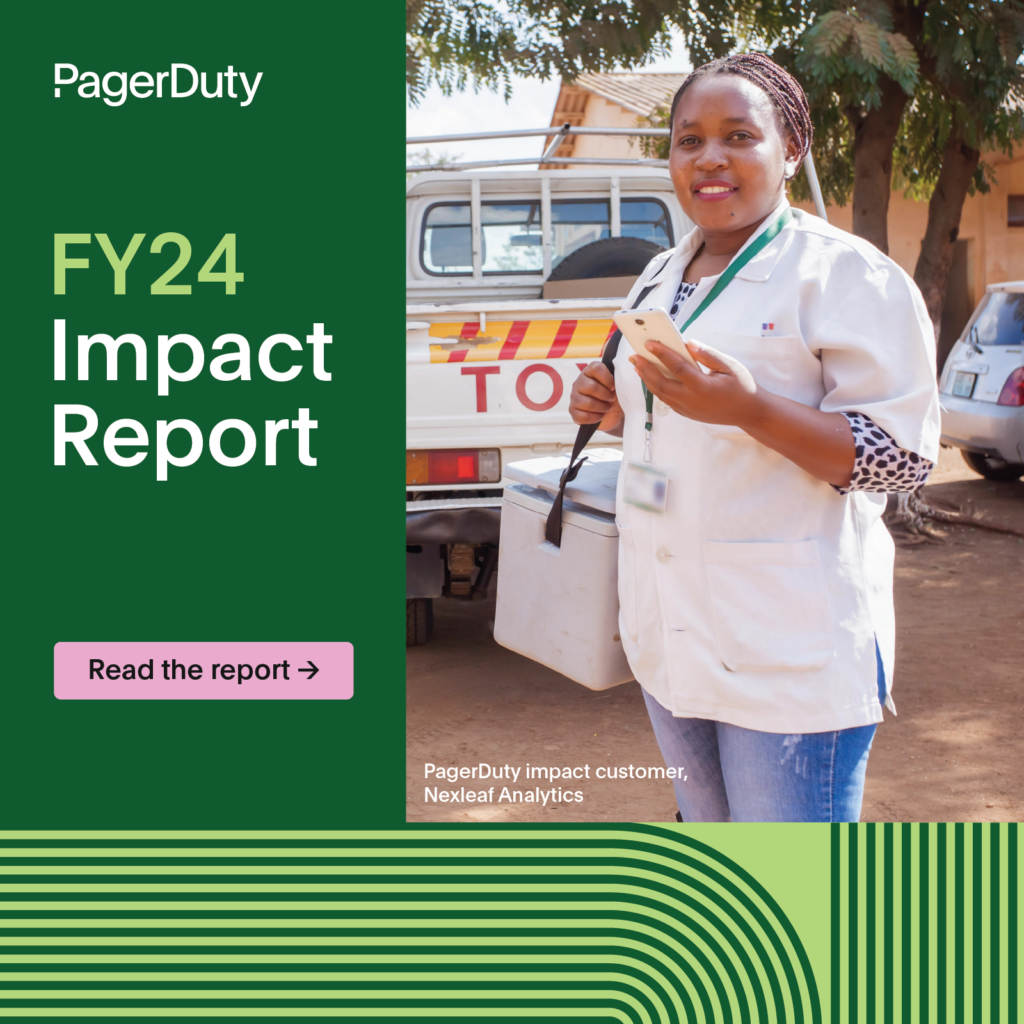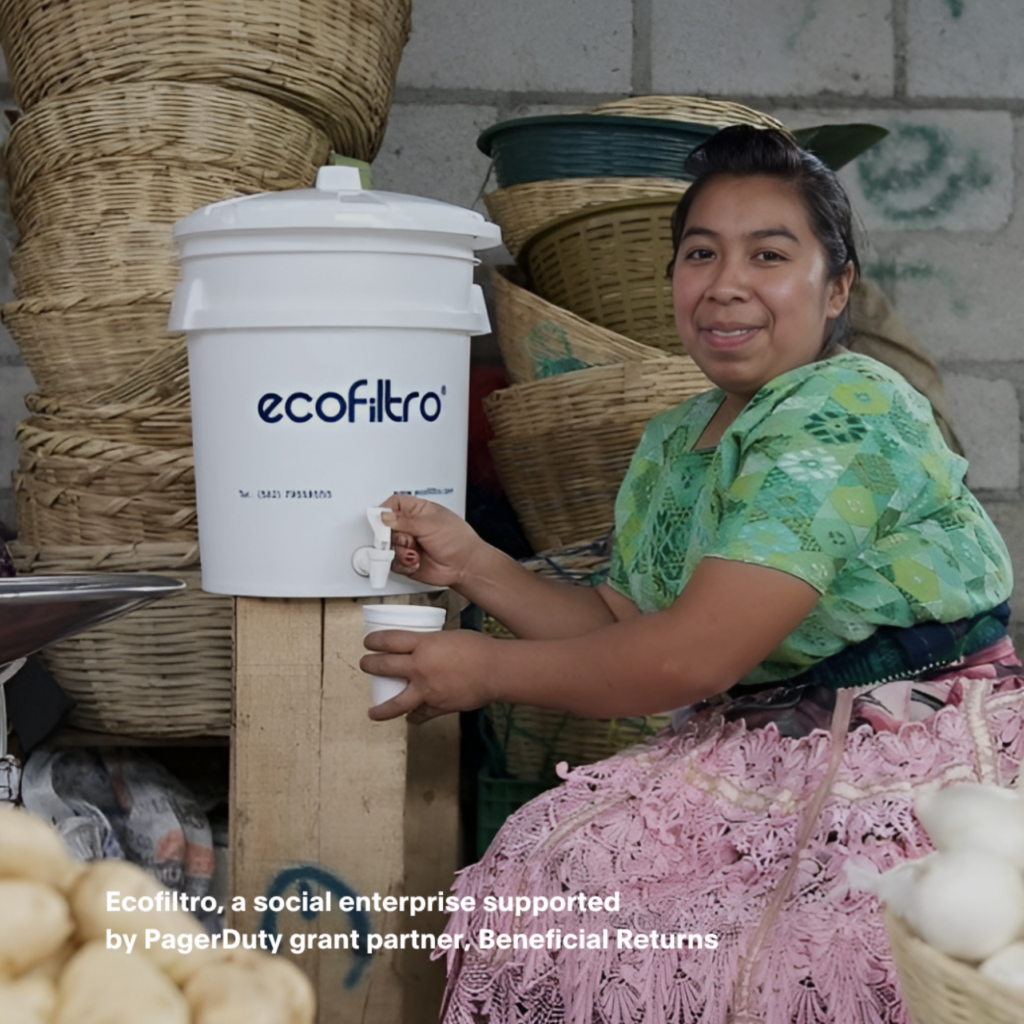PagerDuty’s Climate Equity Journey: Learnings, Partnerships, and What’s Next
PagerDuty launched its impact fund in 2019 with the goal of helping mission-driven organizations meet urgent needs faster. Since then, we’ve distributed over $4 million and mobilized the power of our people, product, and voice to help build a more equitable world by prioritizing our strategic philanthropic investments in two focus areas: Time-Critical Health and Just & Equitable Communities. In 2022, we launched a Climate Equity Fund to prioritize our Just & Equitable Communities investments going forward.
Climate change is the most urgent and complex challenge we face as a global collective. This is important from an equity perspective as the consequences of climate change disproportionately affect economically and socially marginalized communities around the world. These communities typically contribute the least to the causes of climate change yet are rarely consulted, invested in, or trusted to build solutions that put them at the center of healing and thriving. Community solutions are critical but they are not enough. For businesses, proactively engaging in solutions to an endangered planet is critical for long-term value creation. As the environmentalist and mountaineer David Brower said, “There is no business to be done on a dead planet.”
Learnings and Funding Principles
With the imperative to support climate equity in mind, we’ve spent the last year immersed in a deep learning journey. We began this work last winter with the objective to show up as a funder with curiosity and humility — our goal was to listen, learn, and follow the needs of the sector and its leaders. We made an initial investment of $250,000 in four climate equity organizations in February 2022. Some of our salient learnings from our partnership with these organizations and other climate leaders include:
- Only 2% of global philanthropic giving goes to climate equity and less than 1% of giving is directed to community-led groups. We share these numbers — a dismal reflection of where and how funding is directed — to bring attention to this acute funding gap and galvanize more funding and resources for solutions.
- To succeed in the long-term, climate solutions need to center on the communities most impacted by climate change.
- For corporate funders, authentically engaging in climate equity work is an inside and outside job. In other words, funding community efforts is good but not enough; we also have to think about our contributions holistically, including how our business practices may contribute to unintended negative outcomes. We cannot perpetuate a system of harm and use philanthropy to alleviate its symptoms.
Informed by our partnerships, conversations, and learnings, we developed four funding principles to guide our climate equity philanthropy going forward:
- Our funding is most impactful when it fills gaps. We will continue to prioritize organizations led by people of color and women; geographies facing the brunt of climate change; and climate solutions that center frontline communities and their leaders.
- Continued learning and engagement are key to building credibility as a funder, and eventually a leader, in the climate equity space. We seek mutual learnings and open-source what we learn to benefit others.
- We will seek to build a diversified portfolio with a mix of direct funding to frontline organizations and funding through intermediaries.
- We will utilize philanthropic capital across the full spectrum, including mission-related investments, program-related investments, and impact investments. Diversifying how we deploy capital helps us support social impact innovators and leaders with the type of funding that is most valuable for their impact and business model.
New Partnerships
In line with these guiding principles, we’re thrilled to announce partnerships with two phenomenal organizations that are bringing community-built climate solutions to life. These organizations will receive the full spectrum of PagerDuty support, including unrestricted grant funding, skills-based volunteering, access to PagerDuty’s Operations Cloud platform, and voice amplification. We invite you to learn more about these organizations and their impact:
Navajo Power Home: Navajo Power Home provides solar services to off-grid homes on the Navajo Nation – an area that covers 27,000+ square miles across Arizona, New Mexico, and Utah. One third of homes on the Navajo Nation do not have access to reliable electricity and Navajo Power Home is changing that by providing full-service solar electricity. This investment would influence the 0.3% of climate funding received by Indigenous-people led organizations and would help Navajo Power Home bring affordable and clean electricity to 10,000+ homes by 2030.
“While growing up on Navajo Nation without electricity has put so many families in the dark since day one, with solar power we now know the means to utilize our electrical appliances, have our kids do their homework, and keep our food refrigerated. That makes life easier here on Navajo Nation.” – Jerry Williams, General Manager at Navajo Power Home.
Beneficial Returns: Beneficial Returns provides loans to social impact entrepreneurs in Latin America and South East Asia to build climate resilient solutions to challenges faced by their communities. Their portfolio includes social enterprises that support indigenous farmers in Ecuador, develop clean water technology in Indonesia, and bring solar power to homes in Mexico. We’re investing in Beneficial Returns through a combination of a mission-related investment loan that will be returned to the PagerDuty.org impact fund over seven years and a small grant for general operating costs. This creative capital arrangement enables Beneficial Returns to support social entrepreneurs in geographies disproportionately impacted by climate change while supporting our learning journey with full-spectrum social finance.
What’s next for PagerDuty’s climate equity journey?
This is just the beginning of our climate equity philanthropy work. In 2023, we will continue to support community-led efforts and technology solutions in climate equity. We are planning our first-ever annual partner convening to bring our partners together with a wholly partner-led agenda. Our goal is to connect our partners to resources and networks they need to amplify their impact. In addition to our philanthropic efforts, we are committed to climate solutions from a business perspective to mitigate our unintended negative outcomes. Our priorities in 2023 include establishing climate commitments in line with the Paris Accord by establishing near-term climate targets through the Science-Based Targets Initiative (SBTi), and developing strong environmental policies for our workplaces, information systems, finance, and other critical business areas.
We will continue to share our progress and learnings with Dutonians, partners, corporate social impact peers, and investors.


